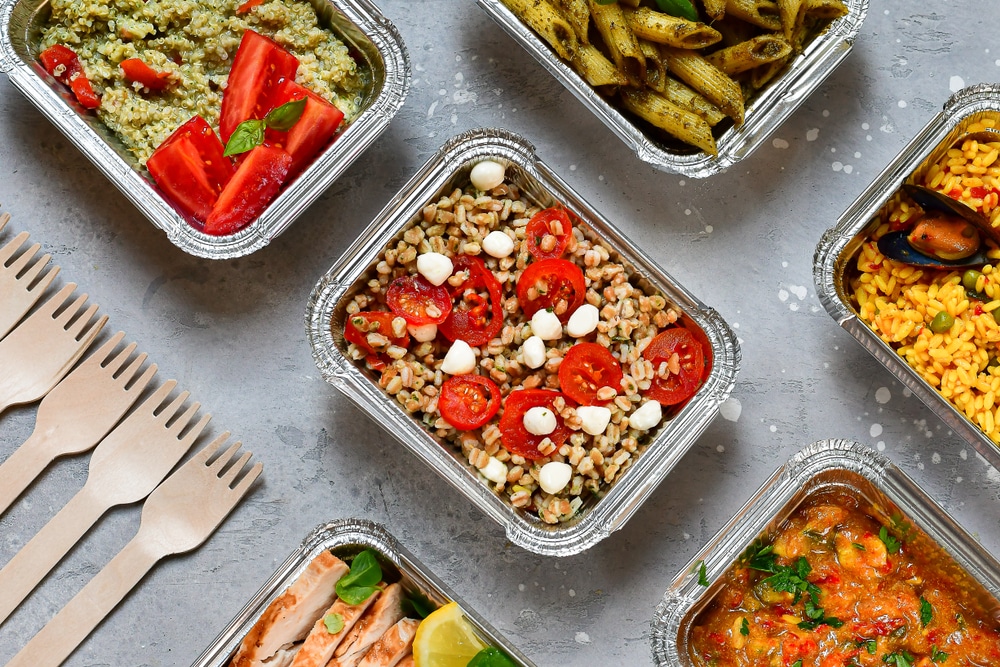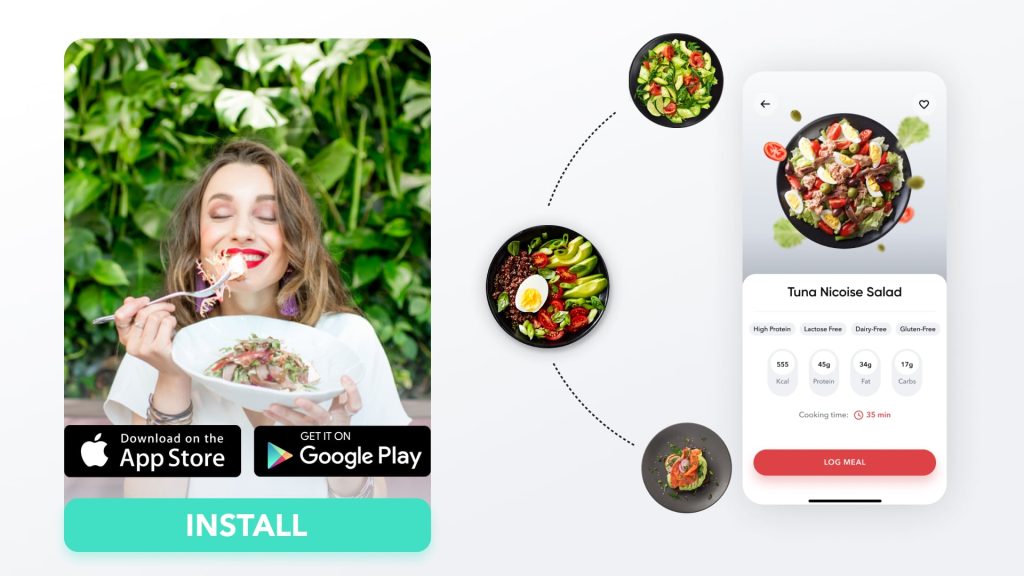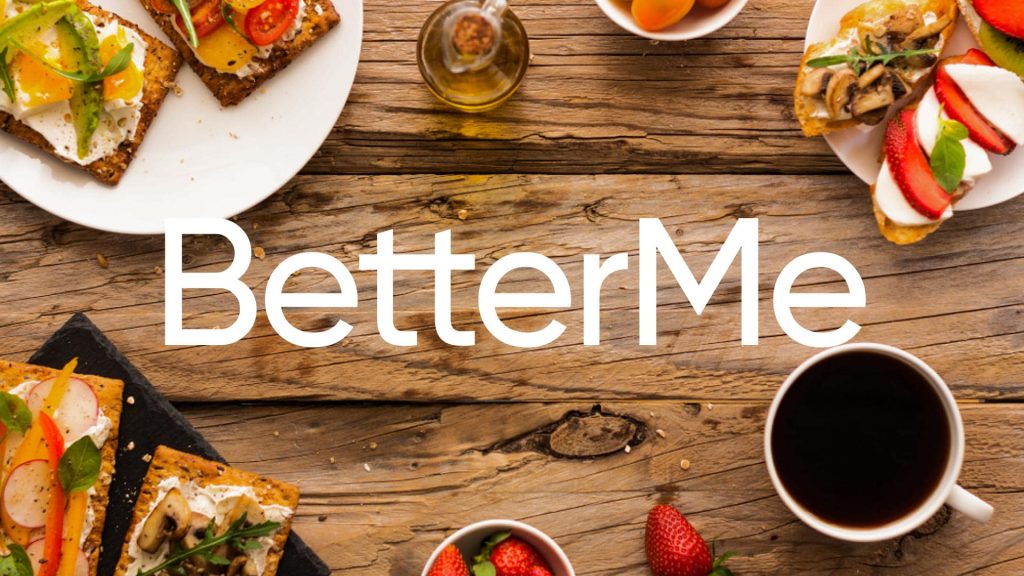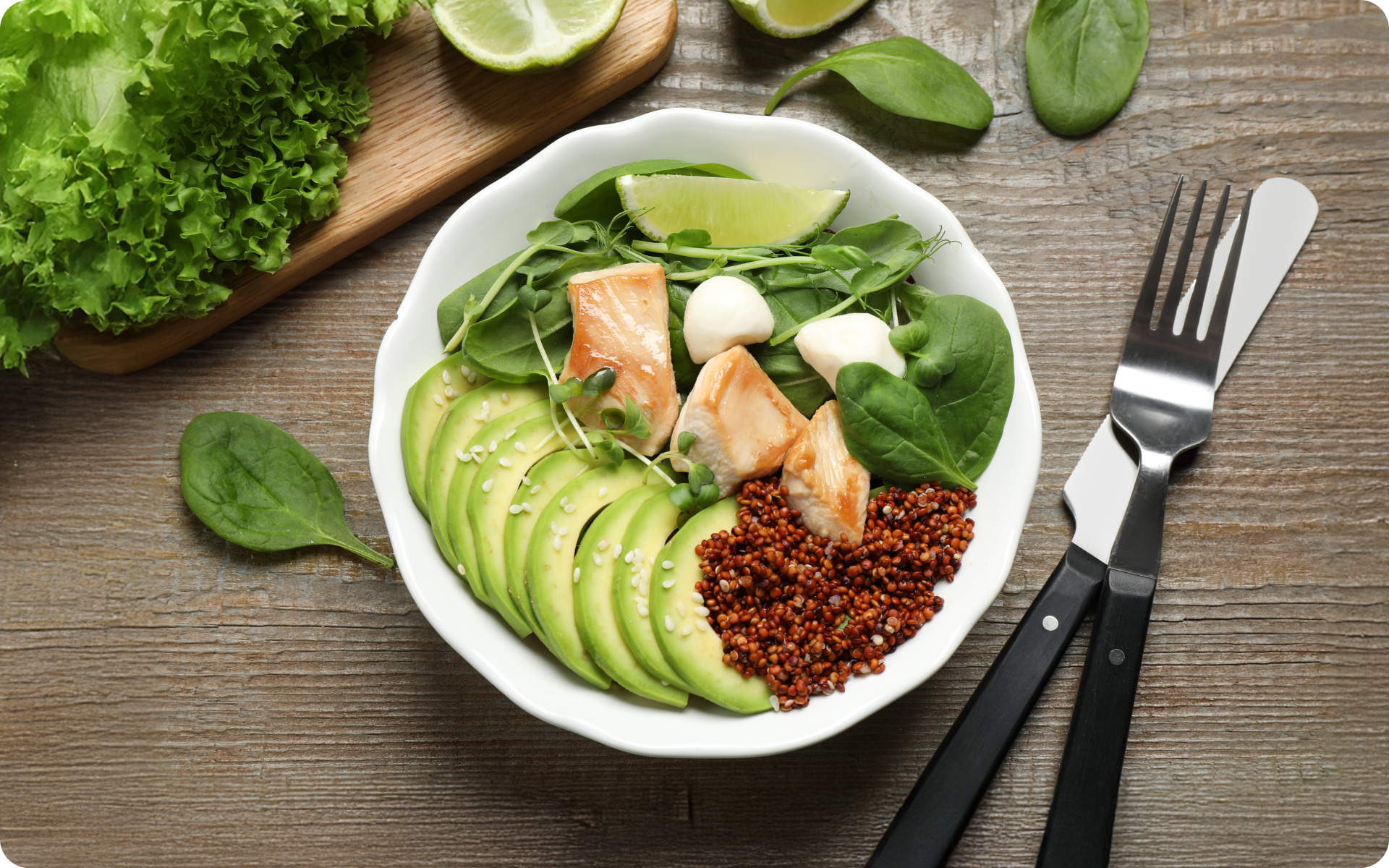Clean eating is a lifestyle choice that focuses on wellness and healthy living, without sacrificing taste, flavor or convenience. It’s about making smarter choices when shopping for groceries (fruits and vegetables instead of processed food), cooking meals (using unprocessed ingredients rather than pre-packaged foods) and dining out (local, fresh options at the market or in restaurants).
The goal of clean eating is to achieve the best possible health by consuming whole foods – fruits, veggies, lean and plant-based proteins, low-fat dairy and whole grains – while avoiding artificial additives often found in processed food as well as “white” flours and sugars. Simply put – it’s changing how you eat to change how you feel and also how you look.
What Are The Benefits Of A 2-Week Healthy Meal Plan?
When it comes to clean eating, you’re what you eat. This nutritional strategy emphasizes fresh and minimally processed foods that are packed with vitamins, minerals and antioxidants (7).
More Nutritious Meals
The result is a diet high in nutrients; low in sugar, sodium and saturated fat; and free of artificial ingredients – like unpronounceable chemicals that enhance flavor or preserve shelf life but aren’t necessary for good health (4).
Better Flavors
For many people who embrace this lifestyle, they feel as if they’ve discovered the true meaning of deliciousness because their meals are fresher than ever before and usually boast more intense flavors.
Health Benefits
Additionally, research suggests that there may be significant health benefits associated with clean-eating practices, such as (2):
- Weight loss
- Lower risk of developing chronic diseases like diabetes and heart disease
- Increased energy throughout the day
Read More: 2-Week Meal Plan On A Budget: How To Eat Healthy And Still Save
How To Get Started On A 2-Week Weight Loss Meal Plan?
Getting started on a clean eating plan is easy – you simply need to know where to begin.
Choose Whole Foods Over Processed Ones
Begin by choosing fresh, whole foods that are lower in sugar and sodium (with an emphasis on fruits, vegetables and lean and plant-based proteins) over packaged and processed goods (5). For example, choose peanut butter made with just peanuts and salt instead of brands with added sugars; Greek yogurt flavored with fruit versus a dessert pudding mix; or an apple instead of juice.
Be Realistic
Next, be realistic about what you can achieve – this isn’t about strict diets but rather improving your current dietary habits. To that end, don’t expect overnight results. Rather, start by swapping one or two ingredients (e.g Greek yogurt instead of sour cream) at a time and work your way up to more sweeping changes over the course of days, weeks or months.
Listen To Your Body
Most importantly, listen to your body and take it slow: If you feel tired after a meal, drink some water and then wait awhile before continuing on with other activities – like going for a run or going back to work. That kind of common-sense advice applies whether you’re following a plant-based diet that’s rich in fresh fruits and vegetables or sticking to cooked chicken breasts without any sauces or marinades. Just follow what feels right for you!
If you’ve mustered up the courage to crush your weight loss goal, let Betterme take the sting out of this demanding process. Our app will help you restructure your habits, remold your life and crank up your fitness results!
The 2-Week Meal Plan For Weight Loss
Clean eating can help you lose weight because you’ll choose foods that are nutrient-dense rather than calorie-dense (6). However, you’ll still need to figure out a calorie deficit to meet your weight loss goals.
If, for example, you’ve been eating 2,300-2,500 calories to maintain your weight then you’ll need to reduce your consumption by around 500-1000 calories. Along with exercise, a good 2 week low carb diet meal plan can help you lose weight.
A few notes about this meal plan. While a keto 2 week meal plan might work for weight loss, not everyone can survive on low carb. Furthermore, clean eating is about wholesome meals and not necessarily restriction. Therefore, this meal plan incorporates all food groups. It’s a low-calorie diet plan with only 1,500 calories per day:
Day 1
- Breakfast: 1 serving of spinach, peanut butter and banana smoothie (324 calories)
- Lunch: 1 serving of vegan superfood buddha bowls (381 calories)
- Snack: 1/4 cup unsalted dry-roasted almonds and 1 sliced medium bell-pepper (243 calories)
- Supper: 1 serving of slow-cooker vegetable minestrone soup, 2 cups of mixed greens, half an avocado and 1 serving of citrus vinaigrette (532 calories)
Total daily macros: 56 g protein, 160 g carbs, 79 g fat
Total number of calories: 1479 calories
Day 2
- Breakfast: 1 serving of overnight oats (510 calories)
- Lunch: 1 serving of grilled cheese and lettuce salad (499 calories)
- Snack: ½ cup of fresh or frozen strawberries (24 calories)
- Supper: 1 serving of beef stir fry with ¾ cup of brown rice (484 calories)
Total daily macros: 89.5g protein, 199 g carbs, 44.2g fat
Total number of calories: 1517 calories
Read More: 12-Hour Night Shift Meal Plan: Healthy Foods To Keep You Energized All Night
Day 3
- Breakfast: 1 cup low-fat plain Greek yogurt, 1/4 cup raspberries with 3 chopped walnuts (325 calories)
- Lunch: 1 serving of vegan superfood buddha bowls with 1 medium orange (443 calories)
- Snack: 1 medium apple with 2 tablespoons of natural peanut butter (305 calories)
- Supper: 1 serving of chicken and kale soup, 2 cups of mixed greens and 1 serving of citrus vinaigrette (420 calories)
Total daily macros: 79g protein,140g carbs, 73g fat
Total number of calories: 1492 calories
Day 4
- Breakfast: 1 serving of power eggs and toast (450 calories)
- Lunch: 1 turkey sandwich made with 2 slices of whole grain rustic bread (537 calories)
- Snack: 100 grams of baby carrots (35 calories)
- Supper: 1 serving of steak and potato with 1¼ cups of mixed berries (484 calories)
Total daily macros: 110.6g protein, 159g carbs, 63.1g fat
Total number of calories: 1506 calories
Day 5
- Breakfast: 1 serving Mediterranean breakfast bowl (418 calories)
- Lunch: 1 serving of veggie-beef bowl and 2 tablespoon nonfat Greek yogurt with ½ a cup of blueberries (519 calories)
- Snack: 1 hard boiled egg (78 calories)
- Supper: 1 serving of grilled chicken and salad with a side of 8 strawberries dipped in 2 tablespoons of whole-milk ricotta cheese, drizzled with 2 teaspoons of agave syrup (473 calories)
Total daily macros: 108g protein, 138g carbs, 59g fat
Total number of calories: 1488 calories
Day 6
- Breakfast: 1 serving of spinach, peanut butter and banana breakfast smoothie (324 calories)
- Lunch: 1 serving of chicken and kale soup with 1 medium banana (376 calories)
- Snack: 1 medium apple with 2 tablespoons of peanut butter (305 calories)
- Supper: 1 serving of sheet-pan Balsamic-parmesan roasted chickpeas and vegetables and 1/3 cup of sliced cucumber with 1/4 cup hummus (508 calories)
Total daily macros: 68g protein, 177g carbs, 63g fat
Total number of calories: 1513 calories
Day 7
- Breakfast: 1 serving of choco peanut smoothie made with low fat milk or almond milk (387 calories)
- Lunch: 1 serving of tuna-lentil bowl with 1 cup of seedless grapes (495 calories)
- Snack: ½ cup low-fat cottage cheese, 1 cup sliced berries (150 calories)
- Supper: 1 serving of shrimp stir fry with cooked brown sorghum and topped with 2 teaspoons of toasted sesame berries (471 calories)
Total daily macros: 90g protein, 184g carbs, 48g fat
Total number of calories: 1503 calories
Reasons why BetterMe is a safe bet: a wide range of calorie-blasting workouts, finger-licking recipes, 24/7 support, challenges that’ll keep you on your best game, and that just scratches the surface! Start using our app and watch the magic happen.
How To Create A 2-Week Rotating Meal Plan For A 2-Week Challenge Diet
Here are a few tips that can make creating a 2 week meal plan easier:
Buy Food That Has A Long Shelf Life
If you’re going to make a meal plan for two weeks, you need to make sure that the meat, vegetables, and fruits you buy will be fresh and edible for two weeks. Go for meats that can be frozen, pre-packed vegetables from the frozen aisles, potatoes, carrots, and apples.
Freeze As Much Food As You Can
Resist the temptation to store food in your pantry, hoping it stays fresh enough to cook in the second week. This applies to fruits and vegetables too. Take some time off to prep and freeze as much of your foods as you can – after all, most nutrients in these foods are preserved in low temperatures (3). You can also look for freezer friendly recipes so that you don’t have to cook much later; just take out of the freezer, thaw, and heat.
Get Creative With The Not So Fresh Produce
Most fruits will start spoiling after about a few days (1). It helps to include fruits creatively in your meals to avoid wastage. You can freeze fruits for smoothies, or use overly ripe ones like bananas in baking recipes instead of sugar.
Buy Back Up Ingredients Just In Case
You should always anticipate a change of plans in the course of the two weeks. So, if you plan on doing one big grocery trip, it’s best to buy extra ingredients for a back-up meal. This meal will cover unexpected guests, or when you don’t feel like sticking to the meal plan and want something different.
Use A Calendar
This should go without saying – it’s impossible to memorize an entire week’s worth of meals, leave alone two. Use a calendar or a spreadsheet to recall what you’re serving for each meal. Identify which ingredient can be used for multiple meals in an efficient manner so that you don’t risk having food go bad before you have time to use it.
In Conclusion
A 2 week meal plan is a useful tool to help you get started on clean eating. The most important thing to remember is that clean eating is about the quality of the food instead of just its quantity. It’s about eating more vegetables than you might be used to, or choosing fresh fruits over processed snacks. Sticking to this plan should help you lose weight and eat healthier.
DISCLAIMER:
This article is intended for general informational purposes only and does not address individual circumstances. It is not a substitute for professional advice or help and should not be relied on to make decisions of any kind. Any action you take upon the information presented in this article is strictly at your own risk and responsibility!
SOURCES:
- A review on mechanisms and commercial aspects of food preservation and processing – Agriculture & Food Security (2017, biomedcentral.com)
- Clean eating: What does that mean? (2019, mayoclinichealthsystem.org)
- Effect of storage temperature and time on the nutritional quality of walnut male inflorescences (2017, sciencedirect.com)
- Food additives (2018, who.int)
- Human health implications of organic food and organic agriculture: a comprehensive review (2017, ncbi.nlm.nih.gov)
- Increased Intake of Foods with High Nutrient Density Can Help to Break the Intergenerational Cycle of Malnutrition and Obesity (2015, ncbi.nlm.nih.gov)
- Is #cleaneating a healthy or harmful dietary strategy? Perceptions of clean eating and associations with disordered eating among young adults – Journal of Eating Disorders (2019, biomedcentral.com)













